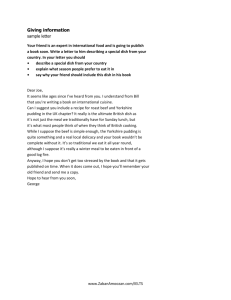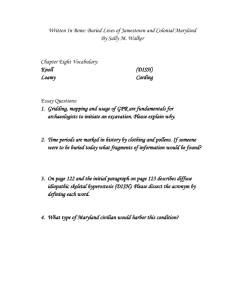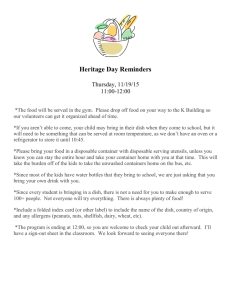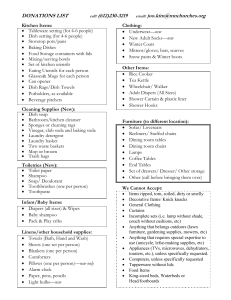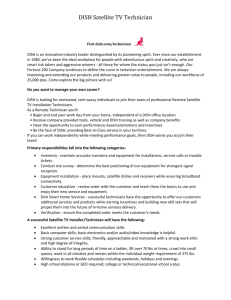File
advertisement
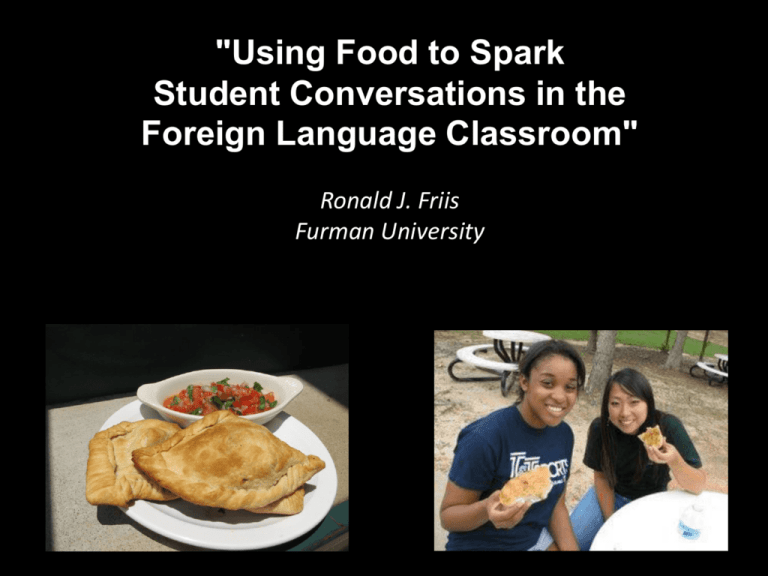
"Using Food to Spark Student Conversations in the Foreign Language Classroom" Ronald J. Friis Furman University Why food? Cultures Comparisons Communities Connections Communication Conversation activities (See handout) Use familiar foods. Ordering in restaurants, cafés. Food and daily routines. Discuss when foods are eaten (or not eaten). Comparisons (of dishes, customs, etc). Cultural analysis of a dish, ingredient or beverage. Describe a US food or custom to someone from the target culture. Start with a painting, photograph or ad. The Super Size Me website. Fast food facts from the Super Size Me website 40 percent of American meals are eaten outside the home. Each day, 1 in 4 Americans visits a fast food restaurant. McDonald's distributes more toys per year than Toys-R-Us. French fries are the most eaten vegetable in America. In the U.S., we eat more than 1,000,000 animals an hour. Some of our top issues Customs and rituals about eating Globalization Food culture in the US Fast vs. slow food cultures Gendered division of work within the house Corn US Latino immigration Writing activities (see handout) Your family's signature dish. A narration and description of a family celebration. Regional dishes/crops/wines from a country. A country's national dish. Describe yourself through/as a dish. Writing advertisements or recipes. A restaurant review (great video project). Analyzing fast and slow food cultures. Discussion of borders in terms of food. 3 questions for your group 1. What three foods, beverages or ingredients from your target culture would spark a rich in-class conversation? 2. What US food custom would be hard to explain to someone from your target culture? 3. What is your family’s “signature dish” and what does it say about you? Projects (see handout) Interview a native speaker about the cultural importance of a dish. Review a meal in the dining hall. Film a restaurant review. Film an advertisement. Website / blog / wiki. Visit a local market. Film a recipe. Día de comida Students cooking Familiarity Visuals Shopping Kitchens Safety A good student recipe… 1.is for a familiar food. 2.indicates the level of difficulty. 3.indicates the needed kitchen equipment. 4.indicates how long is needed to make the dish. 5.contains a shopping list. 6.has clear, step-by-step instructions. 7.contains lots of visuals and tips. http://archivogastronomico.blogspot.com Blog contents: 1. Recipes 2. Syllabus 3. Food vocabulary 4. Images and links to articles 5. Daily reports of what we did 6. A bibliography of Hispanic foods 7. Student essays, projects, videos, etc. Chile * Pebre (una salsa chilena) * Ensalada de quinoa * Empanadas de pino México * Carnitas * Enchiladas * Tamales * Relleno (fácil) para los tamales * Pastel de tres leches * Pozole rojo * Pipián (mole) verde con pollo * Tortillas caseras * Tacos de carne asada * Tacos de pollo en salsa verde * Guacamole Cuba * Frijoles negros - moros * Platanitos fritos * Sándwich cubano US * Southwestern Green Chile Mac & Cheese * Cal-Mex Cuisine: San Diego Fish Tacos * Tex-Mex Cuisine: Chile con queso Honduras * Horchata (hondureña) * Sándwich de pollo hondureño España * Pintxo de plátano y beicon * Pintxo de jamón con alioli * Paella a la parrilla * Samfaina à la Mañé * Espinacas con pasas y piñones * Pinchos morunos * Ensalada sefardita de lentejas * Tortilla española * Pollo al ajillo * Pinchos morunos Unscripted, authentic video input Communication Connections Cultures Communities Comparisons Ron Friis ronald.friis@furman.edu
